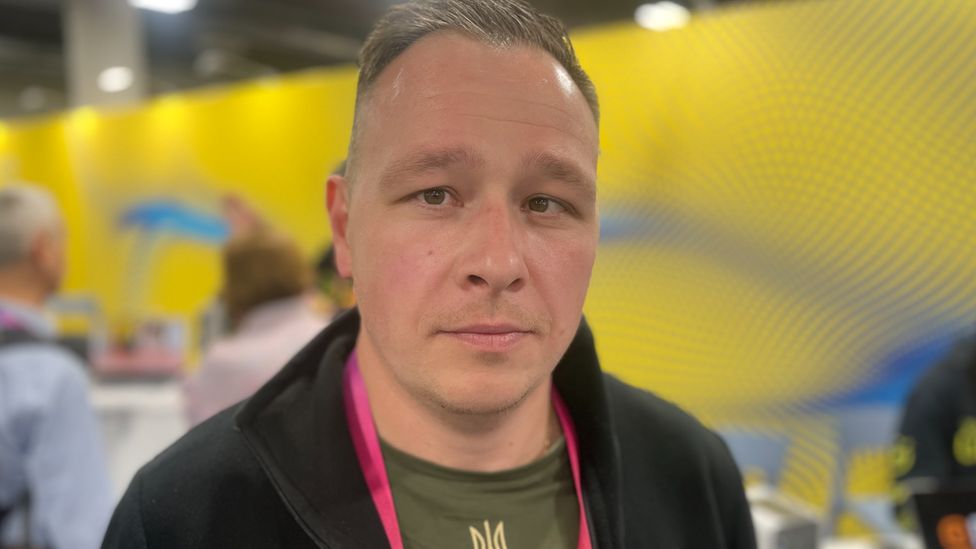Ukraine war: Trying to run start-ups in a conflict

Lyubomyr Dykun says 95% of his workforce "have gone to fight".
He is the chief executive officer of G-Mak, a Ukrainian-based home security company.
His idea is similar to Amazon Ring's home security system – but on steroids.
His company has designed what looks like a small, black box fitted with a camera.
If it detects an intruder it can fire out tear gas to put off any would-be burglar.
"Ukrainians know how to defend" is the company's wry slogan.
However, the war has created a huge problem for him. The workforce he had has been decimated.
"We have lost five people," he says, holding back tears.
Trying to create a successful start-up at the best of times is a huge challenge but doing so at a time of war is punishingly difficult.
Bombing, the targeting of infrastructure and blackouts are just a few of the challenges of working in Ukraine right now.
And yet a delegation of Ukrainian start-ups have made the long journey to Las Vegas, to the world's biggest tech gathering.
For them CES (The Consumer Electronics Show) is a huge opportunity to meet Western investors.
Just getting to the show has been tough.
"It took me three days to get here," says Artem Didinskyi, the co-founder of online kitchen designer Corner.
Ukrainian men under 60 are not allowed to leave the country, so he has had to obtain special permission from Ukrainian authorities to attend.
For him, the countless neon signs of Las Vegas are a far cry from working in Kyiv – where electricity is a luxury.
"Sometimes my working day is limited to the battery of my computer… two weeks ago I didn't have any electricity for three days," he says.
Artem has found a solution of sorts though. His local gas station has a reliable generator. His office is now a petrol pump forecourt. It is the only way the programmer can work.
He says he has no heating in his apartment. "I sleep with my dog in my bed to help keep me warm," he says.
Mariana Romaniak works for Rekava – a company that makes cutlery out of old coffee beans.
Based near the Russian border, in the town of Sumy (near Kharkiv), her business partner made the difficult decision of moving the company across Ukraine – some 800km (500 miles) – to the city of Lviv.
"It's very hard now if you're a business in Ukraine," she says.
On top of bombs and electricity shortages Mariana also says it is almost impossible for new companies to get funding
"All of our big investors and big companies are supporting the army," she says.
It is not all bad news for her company though. Mariana says being in Lviv – close to the border with Poland – has actually helped business.
"We started to think that maybe it's better for us to be near the European Union – because we can deliver more easily," she says.
Another company, eFarm, is set up to help Ukrainian farmers utilise fertiliser on their fields by using satellite technology.
The company has pivoted in the last few months though – and is trialling tech that can spot land mines.
Tatiana Gorzey from eFarm says 30% of Ukrainian fields have been contaminated. "If the fields are millions of acres, it's really difficult to check every inch."
As for Lyubomyr, CEO of G-Mak, he is looking to try to produce his home security units in America.
For him, CES is a vital chance to meet potential investors.
Many of the delegation put a brave face on the war, and hope they can succeed.
And if they can, after all the challenges that the war has thrown at them, they have a pretty good shot at succeeding elsewhere too.
